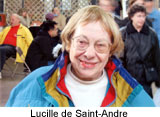|
 LEO, THE ROYAL CADET, recently performed by Toronto Operetta Theatre, (TOT) at
Jane Mallet Theatre to continue its twenty-fifth anniversary
season, was a delightful experience. A more enthusiastic younger
crowd than we usually observe for such established operettas as
The Gypsy Baron, Fledermaus or Countess Maritza applauded wildly
for this Canadian musical comedy. LEO, THE ROYAL CADET, recently performed by Toronto Operetta Theatre, (TOT) at
Jane Mallet Theatre to continue its twenty-fifth anniversary
season, was a delightful experience. A more enthusiastic younger
crowd than we usually observe for such established operettas as
The Gypsy Baron, Fledermaus or Countess Maritza applauded wildly
for this Canadian musical comedy.
This comic Canadian military operetta in four acts was written
by Kingston composer Oscar Ferdinand Telgmann, with libretto by
George F. Cameron and Charles Cameron, and performed for the
first time to great enthusiasm at Martin’s Opera House in
Kingston in 1889.
Over the next 30 years LEO presented more than 1700 performances
until in 1925 it was savaged by a devastating flood that damaged
sets, costumes and orchestra parts beyond repair. After
dedicated research TOT founder and general director Guillermo
Silva-Marin resurrected it and brought it up to its first modern
staging in 2001. He also directed the present version.
It’s now a comic operetta within an operetta in two acts, a real
time-trip with many echoes of Gilbert & Sullivan.
1889 was the year The Eiffel Tower opened in Paris, the Canadian
Pacific Railway was completed and Bayer introduced aspirin
powder in Germany. Canada was 22 years old and the Military
College in Kingston 13 years.
Instead of the elite princes, dukes and counts we usually
encounter in light opera, LEO features Colonel Hewett, the
commandant of The Royal College, and hero Leo and the love of
his life, the valiant Nellie. A swaggering Col. Hewett, sung by
Baritone Robert Longo, is trying to impress Nellie but she
resists him fiercely. Soprano Kristin Galer as Nellie is in fine
voice in duets with Leo, her girl-friends and the colonel. Tenor
Cory O’Brien as Leo matches her in the love scenes although
there is not much chemistry between them. Patrick Whalen is the
upstanding British soldier who sings “I cannot sing of ladies
fair or damosels of high degree” — and continues with,
“Fill up! My toast is of the best, the good old First
Profession, Arms!” His name, a sample of 1889 humour:
Captain Bloodswigger.
Other comic relief comes in two professors of the Kingston
College played by Joseph Angelo and Gregory Finney with
appropriate accents in German and French and some nice dance
routines. But Wind (Stefan Fehr) is lovely as a young poet who
can’t pronounce his R’s as he is working on his “faewy opewa”
and constantly writing down notes “so as not to forget.”
The first act begins, naturally, with a drinking song: “Fill
up The Bowl, Boys,” heartily sung by the cadets in their
brilliant red coats. They are celebrating Queen Victoria’s
birthday with a picnic and eagerly expecting the guests for an
open house at the military college. When the guests (maidens)
arrive they enter from the backs of the auditorium and,
giggling, descend with their parasols through the audience to
appear in full light of the stage with their lovely period
costumes in gorgeous muted shades. Their parasols are
immediately put to good use in dance movements very much in the
Gilbert & Sullivan mode as they sing, “We Are the Maidens.”
Commandant Hewett and Captain Bloodswigger are eager to sign up
new bodies for the South African campaign against the Zulus and
succeed to enlist Leo and his friend, Wind. The commandants
orders the new recruits to leave for the war with the next
transport. Nellie is distressed and fears she may never see Leo
again. Mezzo-soprano Gabrielle Prata is especially good as
Nellie’s friend Caroline. The party ends with a hymn to Pumpkin
Pie and tender farewells.
The British camp at Isandlwana, January 1879. Leo, on a dimly
lit stage filled with leaf shadows volunteers to watch over the
sleeping soldiers and remembering Nellie, sings sadly about
“the days of long ago.” The Zulus sneak up, in a sort of
hissing and low mooing attack. A stylized pantomime battle
ensues with very realistic Zulus and great fun for the audience.
The redcoats run off, pursued by the Valiant Zulus.
The battle is over and the heroes return to the Military
College. Amidst much rejoicing the couples are reunited,
especially Leo and the now happy-again Nellie, and all dance
happily into the night. Wind has finished his Faewi Opewa and
insists on rehearsing it then and there. Everyone loves it.
The orchestra was in the good hands of Conductor/Music Director
Jeffrey Huard, recently in charge of the Mirvish hit SOUND OF
MUSIC. This is a marvelous look back at an early triumph of
Canadian theatre.
|
|

